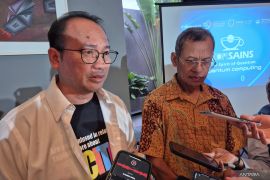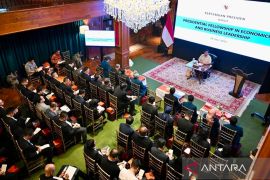Jakarta, (Antara) - Indonesia should remain neutral amid the ongoing Middle East crisis after Arab nations, including Saudi Arabia, Bahrain, the UAE, and Egypt, on Monday, severed diplomatic ties with Qatar, an expert Komaruddin Hidayat stated here, Thursday.
"The Indonesian government needs to understand that we have never been part of the Middle East conflict. Hence, instead of taking sides with the two warring parties, President Joko Widodo, Vice President Jusuf Kalla, and parliament members should promote dialog and reconciliation to ease the tension," Hidayat remarked during an event held in Jakarta.
Following his track record in reconciling the conflict in Aceh Province, Kalla has a capacity to serve as a mediator for the Arab nations and Qatar, Hidayat who was a former rector of the Syarif Hidayatullah State Islamic University Jakarta, noted.
"However, before engaging in the conflict, the Indonesian government needs to stay committed to the Indonesian version of Islam, which highlights peace, tolerance, and a moderate attitude instead of hostility," the expert remarked.
Apparently now, he claimed, there were some groups in the country that are seeking to "import" the Middle-East diplomatic crisis into Indonesia.
"Unlike some countries in the Middle East, Islam peacefully spread in Indonesia. We never clashed with other fellow Muslim nations, so I hope this time, the Indonesian government would continue to maintain the country's harmonious condition," Hidayat, who now serves as a chairman of the Madania Indonesia Foundation, said.
Earlier on Wednesday, Din Syamsuddin, the Indonesian Ulema Council (MUI) consultative board chairman, said the Jeddah-based Islamic Organization Cooperation (OIC) could be utilized to ease the tension among the two warring parties.
During an event held at the Japanese Ambassador Masafumi Ishii's official residence in Jakarta on Wednesday, Syamsuddin stated that the Indonesian government needs to take an immediate measure by calling all OIC members to halt the diplomatic crisis currently occurring in the Arabian Gulf nations.
"Despite many claims stating that the OIC will find it difficult to remaining neutral, Indonesia as well as other members need to give a warning to the group, so it could accommodate the interests of the two warring parties in accordance with the cooperation's charter," Hidayat, who also attended the event, added.
On a similar occasion, Ambassador Ishii, who was hosting a event on Wednesday to break the fast with Islamic figures at his official residence, called all Muslim countries to stay united amid the diplomatic crisis that has now deepened in the Middle East.
"I understand how difficult the situation now is in Qatar as well as the other Arab countries, but if they stay together, all Muslim countries will become strong," the ambassador informed Antara while calling on every warring party to uphold reconciliation in order to resolve the conflict.
On Monday, the Arab nations followed by Yemen, Mauritius, Maldives, and Libya severed diplomatic ties with Qatar, as it was claimed that the country had supported some terrorist groups, including IS and Al Qaeda.
With regard to the accusation, Qatar's Foreign Affairs Ministry, in its written statement posted online, said the severance was unjustified and based on a false claim.
Meanwhile, the OIC, on its official website, urged Qatar to continue to honor its previous commitment to the Gulf Cooperation Council.
"This is particularly with regard to ceasing support for terrorist groups and their activities and ending media incitement," the OIC stated.
"The General Secretariat has underscored the need for all member states, including Qatar, to adhere to the principles of the OIC Charter, which calls for following the policy of being good neighbors; respect for the sovereignty, independence, and territorial integrity of member states; and non-interference in their domestic affairs," it reiterated.(*)





